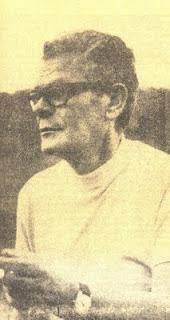Submitted by ICConline on
Marc Chirik passed away 30 years ago, in December 1990. In tribute to the precious contributions of our comrade, of this great revolutionary in the line of Marx, Engels, Lenin and Rosa Luxemburg, we are republishing the two articles from International Review 65 and 66 that were written just after his death. These two articles go over the broad lines of his life and summarise what he brought to the proletarian cause and the defence of marxism.
In this short introduction to these texts, we simply want to underline three essential elements which characterised his life and revolutionary activity.
First, during the course of his life as a militant for more than 70 years, he was, from his youth to his last breath, a devoted fighter, a tireless combatant for the cause of the proletariat and communism. He dedicated all his energy to the intransigent defence of internationalist principles and of marxism. He never ceased to be at the forefront of the struggle, putting to good use his political, theoretical and organisational experience. Revolutionary militancy was a constant compass in his life. Even during the terrible period of the counter-revolution, Marc never gave up the work of patiently elaborating and clarifying the positions of the communist left. During these dark years, he fought against all the betrayals of the proletarian camp but also struggled inside all the organisations in which he militated, against opportunist manoeuvres, against centrist attitudes, against both academic and activist deviations. He was able to hold out during this period and with the same determination was able to play an active part in the resurgence of the proletariat onto the historic scene in May 1968, enthusiastically involving himself in the regroupment of the revolutionary forces which were born out of that period, and which gave birth to the ICC. He brought all his militant energy, his conviction and experience to orienting and constructing this organisation, as well as to the efforts towards the coming together of the organisations of the proletarian political milieu in the 1980s, towards the mutual confrontation and clarification of their positions.
Another fundamental trait of his character was his ability to keep alive the theoretical acquisitions of the revolutionary movement, particularly those produced by the left fraction of the Communist Party of Italy. As a result, he was able to maintain a lucid and critical analysis of the evolution of the world situation. This political “flair”, founded on the global analysis of the balance of class forces, enabled him to question certain “dogmas” of the workers’ movement, not by distancing himself from the historical materialist method, but on the contrary by anchoring himself in in the dynamic evolution of historical reality. At the end of his life, he made a final theoretical contribution by being one of the first in the ICC to recognise that capitalism had entered into the terminal phase of its decline, the phase of decomposition. He also argued that the proletariat could in no way make use of capitalism’s putrefaction and that this situation raised the stakes for the proletariat and the survival of humanity.
The last element we want to emphasis is his determination to transmit the lessons of the workers’ movement and the organisational experience of revolutionaries to the new generations in order to form new militants and to allow the ICC to ensure a political continuity in the future struggles of the class. He was totally convinced of the indispensable need for the revolutionary organisation as a bridge between past, present and future, and he was conscious that he himself represented a link to the past historical experience of the class, that he was part of the living memory of the workers’ movement. While always insisting that “the proletariat gives rise to revolutionary organisations and not revolutionary individuals”, he also laid great stress on the individual responsibilities of each militant and the need for solidarity and respect between comrades.
Nothing can better express Marc’s life than Rosa Luxemburg’s simple phrase: “I was, I am, I will be”.
The articles can be found here:







 del.icio.us
del.icio.us Digg
Digg Newskicks
Newskicks Ping This!
Ping This! Favorite on Technorati
Favorite on Technorati Blinklist
Blinklist Furl
Furl Mister Wong
Mister Wong Mixx
Mixx Newsvine
Newsvine StumbleUpon
StumbleUpon Viadeo
Viadeo Icerocket
Icerocket Yahoo
Yahoo identi.ca
identi.ca Google+
Google+ Reddit
Reddit SlashDot
SlashDot Twitter
Twitter Box
Box Diigo
Diigo Facebook
Facebook Google
Google LinkedIn
LinkedIn MySpace
MySpace